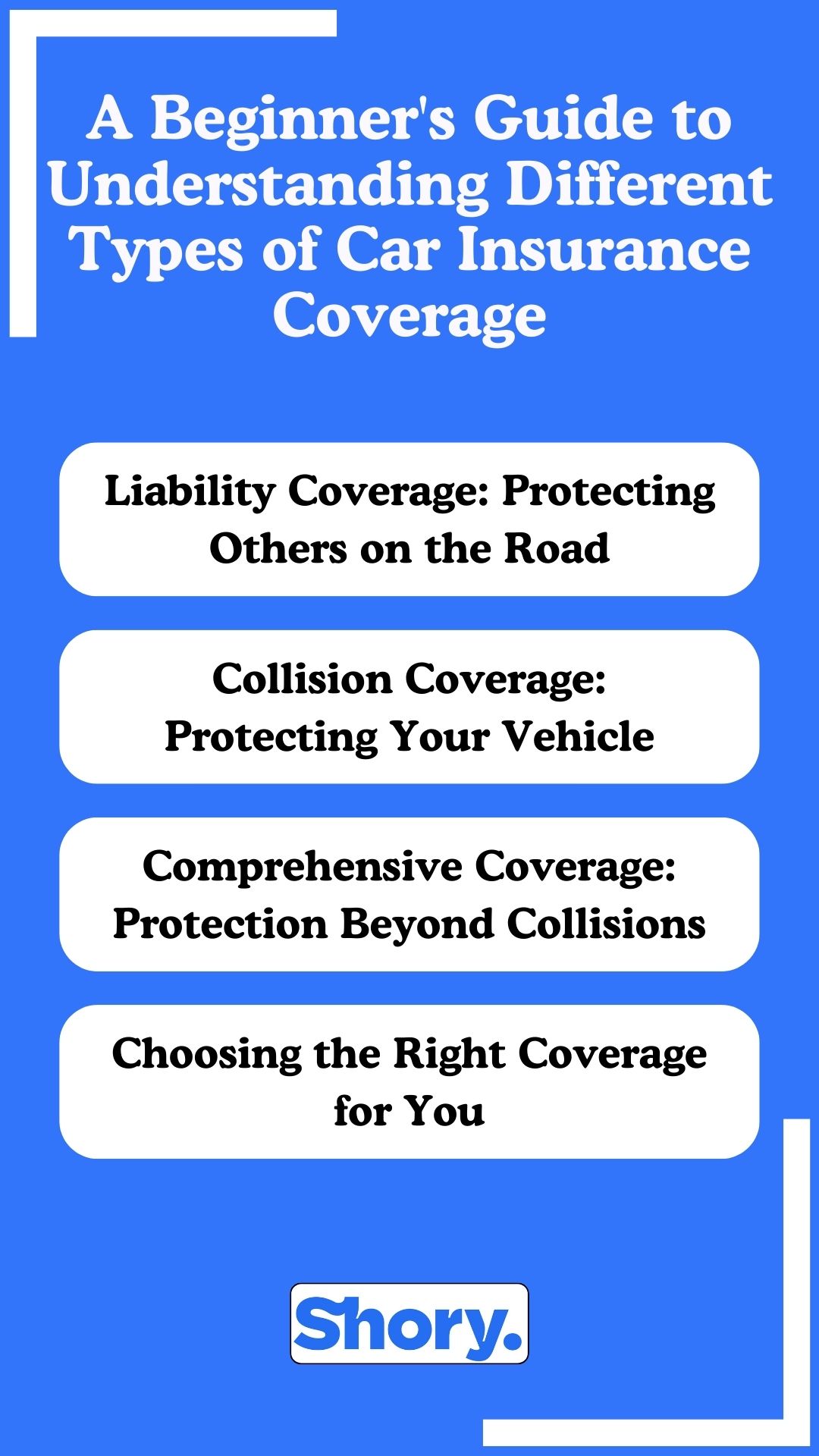
When it comes to car insurance, navigating through the sea of policy options can be overwhelming, especially for beginners. With various types of coverage available, it's crucial to understand what each offers and how they can protect you in different situations. Whether you're a new driver or simply looking to brush up on your insurance knowledge, this beginner's guide will break down the essentials of different car insurance coverage types.
Liability Coverage: Protecting Others on the Road

Liability coverage is the foundation of most car insurance policies and is typically required by law in most states. This type of coverage protects you financially if you're found at fault in an accident that causes injury or property damage to others. There are two main components to liability coverage:
Bodily Injury Liability: This part of the policy covers medical expenses, lost wages, and legal fees for individuals injured in an accident you caused. It also provides coverage if you're sued for damages resulting from the accident.
Property Damage Liability: Property damage liability covers the cost of repairing or replacing vehicles or other property damaged in an accident for which you are at fault. This can include vehicles, buildings, fences, or other structures.
It's essential to have sufficient liability coverage to protect your assets in case of a severe accident. Most insurance experts recommend having liability coverage limits that exceed the minimum required by your state, as medical and repair costs can quickly escalate.
Collision Coverage: Protecting Your Vehicle
Collision coverage steps in to cover damages to your vehicle resulting from a collision with another vehicle or object, regardless of fault. This coverage is particularly valuable for newer or more valuable vehicles, as repair or replacement costs can be substantial.
With collision coverage, your insurance provider will pay for repairs to your vehicle, minus your deductible. If your car is deemed totaled—meaning the repair costs exceed the car's value—the insurance company will typically reimburse you for the actual cash value of the vehicle.
While collision coverage is not legally required, it's often necessary if you have a car loan or lease. Lenders and lessors typically require collision coverage to protect their financial interest in the vehicle.
Comprehensive Coverage: Protection Beyond Collisions

Comprehensive coverage complements collision coverage by protecting your vehicle from non-collision-related incidents. This type of coverage is sometimes referred to as "other than collision" coverage because it applies to a wide range of scenarios, including:
- Theft
- Vandalism
- Fire
- Natural disasters (such as floods, hurricanes, or earthquakes)
- Falling objects (such as trees or branches)
- Animal collisions
Comprehensive coverage reimburses you for the cost of repairing or replacing your vehicle, minus your deductible, in the event of covered damage or loss. Like collision coverage, comprehensive coverage is typically required if you're financing or leasing your vehicle.
Adding comprehensive coverage to your policy provides peace of mind knowing that you're protected against a broader range of risks that could result in costly damage to your vehicle.
Personal Injury Protection (PIP) or Medical Payments Coverage: Covering Your Medical Expenses
Personal Injury Protection (PIP) or Medical Payments Coverage (MedPay) are types of coverage that help pay for medical expenses resulting from a car accident, regardless of fault. While the specifics vary by state, both PIP and MedPay typically cover:
- Medical bills
- Hospitalization
- Rehabilitation
- Lost wages
- Funeral expenses
PIP is required in some states, often referred to as "no-fault" states, where each driver's insurance pays for their medical expenses regardless of who caused the accident. In states without no-fault laws, MedPay is optional but can provide valuable coverage for medical expenses beyond what health insurance may cover.
These coverages are particularly important if you don't have health insurance or have high deductibles, as they ensure you receive necessary medical care without facing overwhelming out-of-pocket expenses.
Choosing the Right Coverage for You
Understanding the different types of car insurance coverage is the first step in making informed decisions about your auto insurance policy. When selecting coverage, consider factors such as your vehicle's value, your financial situation, and any legal requirements in your state.
It's also essential to review your coverage regularly and adjust it as needed to reflect changes in your circumstances, such as buying a new car, moving to a different location, or experiencing life events like getting married or having children.
While it's tempting to opt for the minimum coverage required by law to save money on premiums, adequate insurance coverage can protect you from financial devastation in the event of an accident. Investing in comprehensive coverage that suits your needs and budget is a wise decision that provides invaluable peace of mind on the road.
By familiarizing yourself with the basics of car insurance coverage and understanding how each type protects you, you can confidently navigate the insurance market and make informed choices that safeguard your finances and well-being.


No comments yet